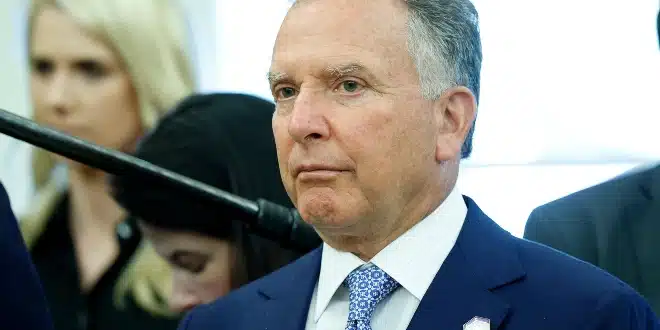U.S. President Donald Trump has confirmed that his special envoy, Steve Witkoff, will travel to Russia later this week—just days before a self-imposed deadline for Moscow to take action to end the war in Ukraine or face new sanctions. The announcement comes amid growing pressure from Washington and rising geopolitical tensions, with Trump also revealing the deployment of two American nuclear submarines to the region.
Submarine Deployment Signals Heightened Pressure
During a media briefing, Trump disclosed that two U.S. nuclear submarines had been sent to undisclosed locations “in the region,” following a tense online exchange with former Russian President Dmitry Medvedev. The president did not clarify whether the submarines are nuclear-powered or equipped with nuclear warheads, nor did he specify their exact locations, which are typically classified for security reasons.
The show of military strength accompanies a looming deadline Trump has set for the Kremlin to take meaningful steps toward ending its ongoing war in Ukraine. If no progress is made by the end of the week, Trump has warned that new, unspecified sanctions will be imposed.
Asked about the message his envoy would deliver to Moscow and what conditions could avert the sanctions, Trump replied bluntly: “Yeah, get a deal where people stop getting killed.”
Diplomatic Outreach and Sanction Threats
Steve Witkoff, a longtime Trump associate, is expected to arrive in Russia on Wednesday or Thursday. The businessman has previously met with Russian President Vladimir Putin multiple times, particularly during earlier, now-stalled efforts by the Trump administration to improve relations with the Kremlin.
The stakes for this latest diplomatic outreach are high. Trump has suggested that if Moscow fails to comply, sanctions could include “secondary tariffs” targeting Russia’s remaining trade partners—most notably China and India. While such measures could further isolate Russia economically, they also risk significant ripple effects across global markets.
Despite escalating rhetoric from Washington, Russia’s military campaign in Ukraine continues unabated.
Putin Reiterates Demands as Fighting Intensifies
Russian President Vladimir Putin, while claiming to desire a “stable and lasting peace,” reiterated Friday that Russia’s conditions for ending the war have not changed. Speaking to journalists, Putin emphasized the need for an agreement that secures both Russian and Ukrainian interests—but insisted that Moscow’s core demands still stand.
These demands include Ukraine relinquishing its claims to four occupied regions that Russia says it has annexed—a position Kyiv firmly rejects. Additionally, Russia wants Ukraine to abandon its goal of joining NATO, a red line for the Kremlin that has fueled the conflict since its early stages.
Conflict Escalates on the Ground
Over the weekend, Ukraine launched a drone strike that ignited a fire at an oil depot in Sochi, the Russian city that hosted the 2014 Winter Olympics. Kyiv has vowed to escalate its air assault in response to intensified Russian attacks that have killed numerous civilians in recent weeks.
In a statement Monday, Russia’s Defense Ministry claimed its air defense systems shot down 61 Ukrainian drones overnight. Meanwhile, Ukrainian officials reported that Russian shelling killed one person in the southern Kherson region.
Adding to the complexity, Ukrainian President Volodymyr Zelensky announced that negotiations with Russia in Istanbul last month have paved the way for a potential prisoner swap. The proposed exchange would see 1,200 Ukrainian soldiers return home.
Trump’s Position on Ukraine War Grows Harsher
Trump, now in his second term, began his presidency with confident predictions that the war in Ukraine—ongoing since Russia’s full-scale invasion in February 2022—would be brought to an end. However, his tone has shifted in recent weeks.
Expressing growing dissatisfaction with Moscow’s prolonged offensive, Trump has increasingly criticized Putin’s refusal to de-escalate the conflict, suggesting that the time for diplomatic patience may be running out.
As the August deadline approaches, all eyes will be on the outcome of Witkoff’s trip and whether the threat of additional sanctions will be enough to influence Moscow’s position—or further deepen the rift between East and West.


